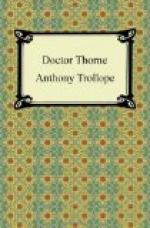And Beatrice, too, had done harm in this matter. With a spirit painfully unequal to that of her grand relatives, she had quizzed Mary and Frank about their early flirtations. This she had done; but had instinctively avoided doing so before her mother and sister, and had thus made a secret of it, as it were, between herself, Mary, and her brother;—had given currency, as it were, to the idea that there might be something serious between the two. Not that Beatrice had ever wished to promote a marriage between them, or had even thought of such a thing. She was girlish, thoughtless, imprudent, inartistic, and very unlike a De Courcy. Very unlike a De Courcy she was in all that; but, nevertheless, she had the De Courcy veneration for blood, and, more than that, she had the Gresham feeling joined to that of the De Courcys. The Lady Amelia would not for worlds have had the De Courcy blood defiled; but gold she thought could not defile. Now Beatrice was ashamed of her sister’s marriage, and had often declared, within her own heart, that nothing could have made her marry a Mr Moffat.
She had said so also to Mary, and Mary had told her that she was right. Mary was also proud of blood, was proud of her uncle’s blood, and the two girls talked together in all the warmth of girlish confidence, of the great glories of family traditions and family honours. Beatrice had talked in utter ignorance as to her friend’s birth; and Mary, poor Mary, she had talked, being as ignorant; but not without a strong suspicion that, at some future time, a day of sorrow would tell her some fearful truth.
On one point Mary’s mind was strongly made up. No wealth, no mere worldly advantage could make any one her superior. If she were born a gentlewoman, then was she fit to match with any gentleman. Let the most wealthy man in Europe pour all his wealth at her feet, she could, if so inclined, give him back at any rate more than that. That offered at her feet she knew she would never tempt her to yield up the fortress of her heart, the guardianship of her soul, the possession of her mind; not that alone, nor that, even, as any possible slightest fraction of a make-weight.
If she were born a gentlewoman! And then came to her mind those curious questions; what makes a gentleman? what makes a gentlewoman? What is the inner reality, the spiritualised quintessence of that privilege in the world which men call rank, which forces the thousands and hundreds of thousands to bow down before the few elect? What gives, or can give it, or should give it?’
And she answered the question. Absolute, intrinsic, acknowledged, individual merit must give it to its possessor, let him be whom, and what, and whence he might. So far the spirit of democracy was strong with her. Beyond this it could be had but by inheritance, received as it were second-hand, or twenty-second hand. And so far the spirit of aristocracy was strong within her. All this she had, as may be imagined, learnt in early years from her uncle; and all this she was at great pains to teach Beatrice Gresham, the chosen of her heart.




